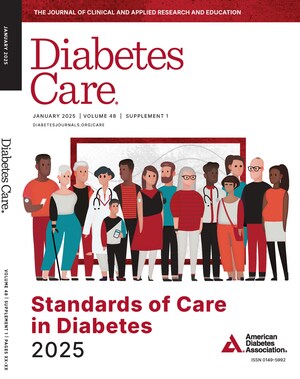ORLANDO, Fla., June 25, 2018 /PRNewswire-USNewswire/ -- New research shows that Asian Indian immigrants in the U.S. are at increased risk for chronic diseases including type 2 diabetes (T2D) and cardiovascular disease (CVD). Adopting American lifestyle behaviors may specifically affect HbA1c levels and high-density lipoproteins (HDL) cholesterol levels in this group, according to the study, "Mediating Role of Acculturation and Lifestyle Behaviors on Cardiometabolic Risks among Asian Indians in the United States," presented today at the American Diabetes Association's® (ADA's) 78th Scientific Sessions® at the Orange County Convention Center.
Asian Indians are currently the second-largest and fastest-growing Asian American group in the U.S., and research has indicated they are often prone to developing obesity, CVD and diabetes due to acculturation, specifically unhealthy eating habits and lack of exercise. Researchers conducted a secondary data analysis of a landmark study (Misra, 2009) that collected data from a large, national sample of 1,038 randomly selected Asian Indian adults (average age, 48.5 years) from seven U.S. cities to measure the prevalence of diabetes, metabolic syndrome and CVD.
This analysis examined the influencing role that lifestyle, specifically physical activity and dietary behavior, had on acculturation and the development of diabetes and CVD among the study participants. Acculturation was assessed using the English proficiency scores from the Acculturation Scale for Southeast Asians, and dietary behavior and physical activity were calculated from the subscales of the Health-Promoting Lifestyle Profile II. The data on cardiometabolic risk factors were collected using HbA1c levels, fasting blood glucose levels, body mass index, systolic and diastolic blood pressure, and lipid profiles (HDL, LDL, total cholesterol and triglycerides).
The results of the analysis found that dietary behavior and physical activity did not mediate the relationship between acculturation and many of the risk factors for diabetes and CVD. There was some effect, however, on HbA1c levels and HDL cholesterol levels—dietary behavior mediated the association between acculturation and HbA1c levels, and physical activity mediated the association between acculturation and HDL levels. Researchers concluded that dietary and physical activity interventions that are culturally specific might help lower risks of developing diabetes and CVD in Asian Indian immigrants. Researchers noted that additional research is needed to understand the mechanisms by which acculturation affects other cardiometabolic risk factors such as smoking, alcohol consumption, psychosocial factors and abdominal obesity.
"Acculturation levels influence lifestyle behaviors, and in turn, increase the risks for developing type 2 diabetes and cardiovascular disease among Asian Indians in the U.S., yet a gap exists in thoroughly understanding the risk factors and the need for screenings and lifestyle modifications to effectively lower those risks," said lead study author Nitha Mathew Joseph, PhD, RN, assistant professor at the Cizik School of Nursing at The University of Texas Health Science Center at Houston. "Designing culturally tailored dietary education and physical activity interventions for this high-risk ethnic group may promote positive lifestyle changes that have the potential to reduce and/or prevent cardiometabolic risks among U.S. Asian Indians. Plans for future research include enhancing data collection to include information about all of the modifiable cardiometabolic risk factors. Ultimately, better understanding and prevention strategies will reduce the health and economic burden associated with these chronic conditions among Asian Indians."
To speak with Dr. Mathew Joseph, please contact the ADA Press Office on-site at the Orlando Convention Center on June 22-26, by phone at 407-685-4010 or by email at [email protected].
The American Diabetes Association's 78th Scientific Sessions, to be held June 22-26, 2018, at the Orange County Convention Center in Orlando, is the world's largest scientific meeting focused on diabetes research, prevention and care. During the five-day meeting, more than 16,000 health care professionals from around the world will have exclusive access to more than 3,000 original diabetes research presentations, participate in provocative and engaging exchanges with leading diabetes experts, and can earn Continuing Medical Education (CME) or Continuing Education (CE) credits for educational sessions. The program is grouped into eight theme areas: Acute and Chronic Complications; Behavioral Medicine, Clinical Nutrition, Education and Exercise; Clinical Diabetes/Therapeutics; Epidemiology/Genetics; Immunology/Transplantation; Insulin Action/Molecular Metabolism; Integrated Physiology/Obesity; and Islet Biology/Insulin Secretion. Felicia Hill-Briggs, PhD, ABPP, President of Health Care and Education, will deliver her address, "The American Diabetes Association in the Era of Health Care Transformation," on Saturday, June 23, and Jane E.B. Reusch, MD, President of Medicine and Science, will present her address, "24/7/365 – Lifetime with Diabetes," on Sunday, June 24. In total, the 2018 Scientific Sessions includes 375 oral presentations; 2,117 poster presentations, including 47 moderated poster discussions; and 297 published-only abstracts. Join the Scientific Sessions conversation on social media using #2018ADA.
About the American Diabetes Association
Nearly half of American adults have diabetes or prediabetes; more than 30 million adults and children have diabetes; and every 21 seconds, another individual is diagnosed with diabetes in the U.S. Founded in 1940, the American Diabetes Association (ADA) is the nation's leading voluntary health organization whose mission is to prevent and cure diabetes, and to improve the lives of all people affected by diabetes. The ADA drives discovery by funding research to treat, manage and prevent all types of diabetes, as well as to search for cures; raises voice to the urgency of the diabetes epidemic; and works to safeguard policies and programs that protect people with diabetes. In addition, the ADA supports people living with diabetes, those at risk of developing diabetes, and the health care professionals who serve them through information and programs that can improve health outcomes and quality of life. For more information, please call the ADA at 1-800-DIABETES (1-800-342-2383) or visit diabetes.org. Information from both of these sources is available in English and Spanish. Find us on Facebook (American Diabetes Association), Twitter (@AmDiabetesAssn) and Instagram (@AmDiabetesAssn).
| 247-OR |
Mediating Role of Acculturation and Lifestyle Behaviors on Cardiometabolic Risks |
78th Scientific Sessions
News Briefing: Population Health Strategies, Monday, June 25, 1:00 p.m. ET
Session Title: Diabetes Self-Management Education and Support—Embracing Data and Digital Dialogue Advances
Session Type: Oral Presentations
Location: W204
Session Time: Monday, June 25, 2018, 8:00 - 10:00 am
Authors: NITHA MATHEW JOSEPH, RANJITA MISRA, JING WANG, STANLEY CRON, PADMAVATHY RAMASWAMY, Houston, TX, Morgantown, WV
Background: Asian Indians are the 2nd largest group of Asian immigrants in the U.S. and have higher rates of diabetes, metabolic syndrome, and cardiovascular disease than the general U.S. population and other immigrant groups. Acculturation levels influence lifestyle practices, and studies have reported that acculturated individuals have increased risks for chronic diseases.
Aim: Hence, this study explored the mediating role of lifestyle behaviors (physical activity and dietary behavior) between acculturation and cardiometabolic risk factors among Asian Indians using the Diabetes in Indian Americans national study.
Methods: The sample comprised 1038 randomly selected adult Asian Indians in seven U.S. sites (mean age, 48.54 years). Acculturation was assessed using the English proficiency scores from the Acculturation Scale for Southeast Asians, and dietary behavior and physical activity were calculated from the subscales of Health-Promoting Lifestyle Profile II. Path analyses with bootstrap methods were used to determine whether physical activity or dietary behavior mediates the relationship between acculturation and cardiometabolic risk factors (HbA1c, fasting blood glucose levels, body mass index, systolic and diastolic blood pressure, and lipid profiles [HDL, LDL, total cholesterol, and triglycerides]).
Results: Dietary behavior significantly mediated the relationship between acculturation and HbA1C (β=0.004, p = .047), and physical activity mediated the relationship between acculturation and HDL (β=0.08, p = .011). All other mediation models were not significant (p>.05) based on the nonsignificant indirect effects detected in the models.
Conclusion: Culturally specific dietary education and physical activity interventions for this high-risk ethnic group may have the potential to reduce cardiometabolic risks. The results provide a firm basis for developing educational programs.
Author Disclosures: N. Mathew Joseph: None. R. Misra: None. J. Wang: None. S. Cron: None. P. Ramaswamy: None.
Press Office in Orlando
June 22 - 26, 2018
407-685-4010
Contact:
Michelle Kirkwood
(703) 299-2053
[email protected]
SOURCE American Diabetes Association
Related Links
WANT YOUR COMPANY'S NEWS FEATURED ON PRNEWSWIRE.COM?
Newsrooms &
Influencers
Digital Media
Outlets
Journalists
Opted In






Share this article